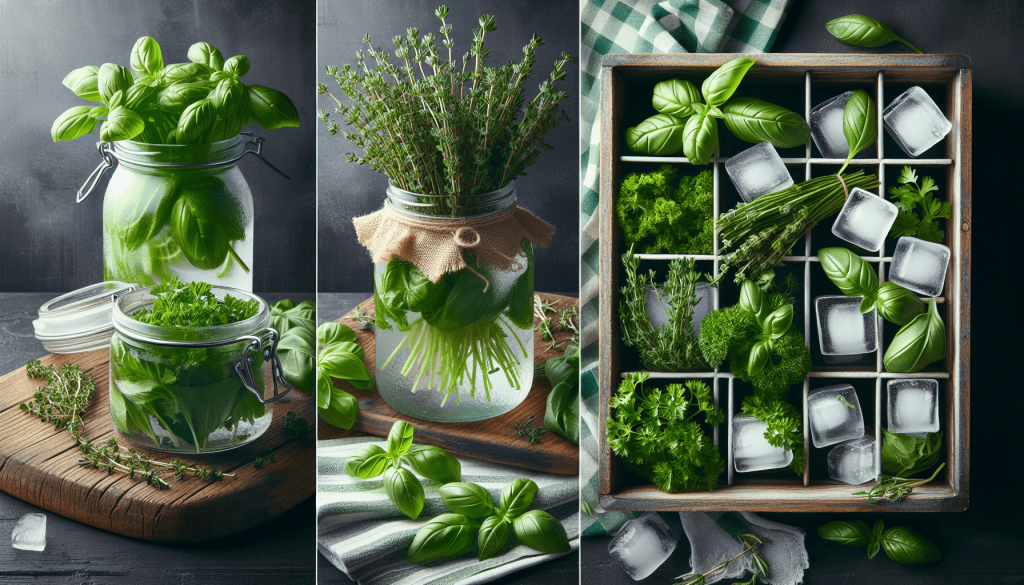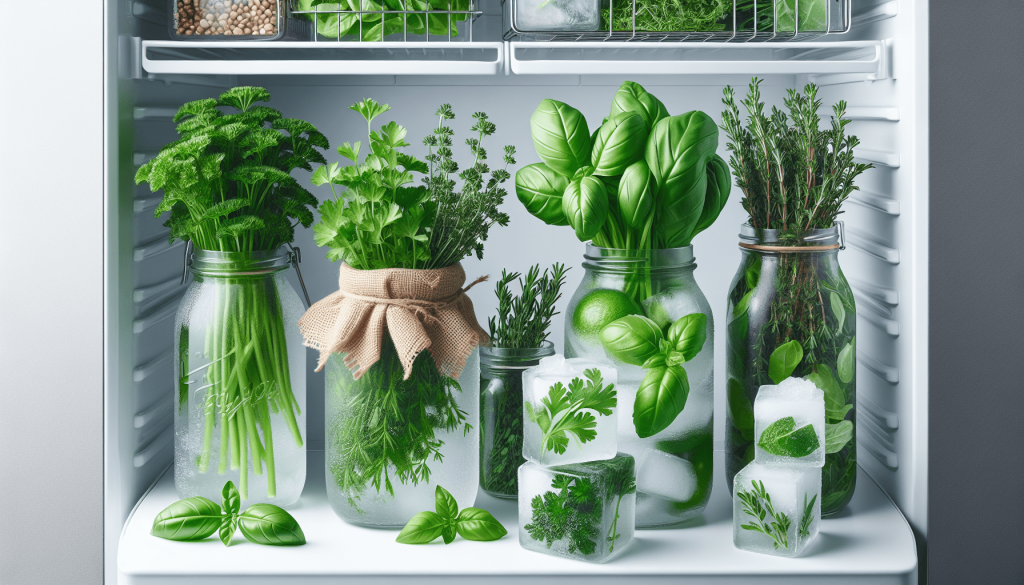Fresh herbs can elevate the flavors of your dishes, adding a burst of freshness and aromatic goodness. But how can you make sure they stay vibrant and retain their flavor for longer? In this article, we will explore the best way to store fresh herbs, ensuring that you always have a stash of fragrant and delicious ingredients at your fingertips. Discover simple yet effective methods to extend the shelf life of your favorite herbs, so you can enjoy their vibrant flavors for days or even weeks to come. Get ready to unlock the secrets to keeping your herbs at their peak, and elevate your culinary creations to new heights.

Storing Fresh Herbs
When it comes to storing fresh herbs, the ideal conditions can play a significant role in maintaining their freshness and flavor. Proper storage can help extend the shelf life of herbs, allowing you to use them in your cooking for an extended period. So, let’s take a look at the ideal storage conditions for fresh herbs.
Ideal Storage Conditions
The primary factors to consider when storing fresh herbs are temperature, humidity, and airflow. Herbs are delicate and vulnerable to moisture, heat, and air, which can cause them to wilt and lose their aromatic properties. Ideally, herbs should be stored in a cool place with low humidity, such as the refrigerator.
Choosing the Right Container
Selecting the right container for storing fresh herbs is crucial to maintain their quality. Opt for containers that provide adequate airflow to prevent the accumulation of moisture, which can lead to spoilage. Many herb enthusiasts find that using glass jars or plastic containers with ventilation holes works best for storing fresh herbs.
Preparing the Herbs for Storage
Before storing fresh herbs, it is essential to properly prepare them to ensure longevity. Start by removing any damaged or wilted leaves and discarding them. Then, gently wash the herbs under cold running water to remove any dirt or debris. Finally, pat them dry with a clean towel or use a salad spinner to eliminate excess moisture.
Different Methods for Storage
There are several methods you can choose from to store fresh herbs effectively. Refrigeration, preserving in oil, drying, and freezing are some popular options. Depending on your preference and the specific type of herb, you can select the most suitable method to preserve their flavor and aroma.
Refrigerating Fresh Herbs
Refrigeration is a commonly used method to store fresh herbs, especially those with delicate leaves. Proper trimming, moisture control, and the right storage conditions in the refrigerator can help prolong the freshness of your herbs.
Trimming and Tidying
Start by trimming the ends of the stems of your fresh herbs. Removing any damaged or wilted leaves is also important in ensuring the longevity of the herbs. Once trimmed, make sure to remove any excess moisture by gently patting the herbs dry.
Moisture Control
To control moisture levels, wrap the herbs loosely in a paper towel before storing them in a plastic bag. This will help absorb any excess moisture while also providing a barrier against condensation. Remember to leave the bag slightly open to allow for some airflow, preventing the herbs from becoming too damp.
Storing in Plastic Bags
It is best to store fresh herbs in plastic bags that have been specifically designed for food storage. These bags help maintain the humidity levels required for preserving the herbs. Place the wrapped herbs in the bag, seal it, and store it in the refrigerator’s crisper drawer.
Using a Damp Paper Towel
Another effective way to refrigerate fresh herbs is by using a damp paper towel. Place the herbs on a damp paper towel and carefully roll it up, ensuring that the herbs are evenly distributed. Place the rolled-up towel in a plastic bag, leaving it slightly open for airflow, and store it in the refrigerator.
Freezing in Ice Cubes
Freezing fresh herbs in ice cubes can be a convenient method for storing them long-term. Chop the herbs finely and place them in ice cube trays. Fill each cube with water or olive oil and freeze. Once frozen, transfer the herb-infused cubes to a sealed container or freezer bag, and you can easily add them to your dishes whenever you need them.

Preserving Fresh Herbs in Oil
Preserving fresh herbs in oil is a wonderful way to capture their flavors and have them readily available whenever you need them. This method not only adds depth to your dishes but also maintains the herbs’ vibrant colors.
Choosing the Herbs
Selecting the right herbs for preserving in oil is crucial. Opt for fresh herbs with vibrant colors and robust aromas. Some popular choices include basil, rosemary, thyme, and oregano. However, it is important to note that some herbs, like parsley and cilantro, are not suitable for this preservation method due to their high water content.
Washing and Drying
Before preserving herbs in oil, ensure they are clean and thoroughly dry. Gently wash the herbs under running water and pat them dry to remove any excess moisture. Be cautious not to bruise or damage the leaves during the washing process.
Infusing Oil with Herbs
To infuse oil with herbs, start by bruising or lightly crushing them to release their essential oils. Place the herbs in a sterilized jar and pour in olive oil, ensuring the herbs are fully submerged. Seal the jar tightly and allow it to sit at room temperature for a few weeks, allowing the flavors to meld together. Strain the oil before storage to remove any bits of herbs.
Storing in Oil
After infusing the oil with herbs, transfer it to a clean, airtight container. Store the container in a cool, dark place, such as a pantry or cupboard away from direct sunlight. It’s important to note that while properly preserved herb-infused oils can last for several months, it is essential to regularly check for any signs of spoilage or rancidity.
Drying Fresh Herbs
Drying fresh herbs is one of the oldest methods of preserving them, allowing you to enjoy their flavors and aromas year-round. Whether you prefer air drying, microwave drying, oven drying, or using a dehydrator, there are various ways to successfully dry your herbs.
Air Drying
One of the simplest and most traditional methods of drying fresh herbs is air drying. Gather a small bunch of herbs, tie them together at the stems with twine, and hang them in a well-ventilated area away from direct sunlight. Ensure that the herbs are suspended upside down to allow for proper airflow. After a few weeks, once the herbs are completely dry, remove the leaves from the stems and store them in an airtight container.
Microwave Drying
Microwave drying is a quick and efficient method to dry herbs. Place a single layer of herbs on a microwave-safe plate lined with a paper towel. Microwave the herbs in short bursts, checking their progress frequently to prevent scorching. Once the herbs are dry and brittle, remove the leaves from the stems, crumble them, and store them in airtight containers for future use.
Oven Drying
Oven drying is another popular method for drying fresh herbs. Preheat your oven to a low temperature, around 150°F (65°C). Spread the herbs in a single layer on a baking sheet lined with parchment paper. Place the sheet in the preheated oven and leave the door slightly ajar to allow air circulation. Check the herbs regularly, and once they are dry and crumble easily, remove them from the oven, let them cool, and store them in airtight containers.
Dehydrator Drying
Using a food dehydrator is a convenient and precise way to dry fresh herbs. Simply spread the herbs on the dehydrator trays in a single layer, making sure they do not overlap. Set the dehydrator to the recommended temperature for drying herbs and leave them until they are crispy and dry. Once dried, remove the leaves from the stems and store them in airtight containers away from light and heat.
Herb-Specific Storage Tips
Different herbs have different characteristics and require specific storage methods to maintain their freshness and flavor. Here are some herb-specific storage tips:
Basil
Basil is a delicate herb that should not be refrigerated. Instead, store it at room temperature away from direct sunlight. Place the stems in a glass of water, similar to fresh flowers, and cover the leaves with a plastic bag to retain moisture. Change the water every couple of days to prolong its freshness.
Cilantro
Cilantro is best stored in the refrigerator to maintain its vibrancy and flavor. Before refrigerating, trim the ends of the stems, place the bunch in a jar with an inch of water, and loosely cover it with a plastic bag. Change the water every couple of days to keep the cilantro fresh.
Mint
To store fresh mint, start by trimming the ends of the stems. Place the mint stems in a jar with an inch of water and cover them loosely with a plastic bag. Keep the jar in the refrigerator and change the water every couple of days to ensure the mint stays fresh and crisp.
Parsley
Parsley can be stored by trimming the ends of the stems and placing them in a jar with an inch of water. Loosely cover the leaves with a plastic bag and store them in the refrigerator. Remember to change the water every couple of days to maintain the freshness.
Rosemary
Rosemary can be stored either in the refrigerator or dried for long-term use. If storing in the refrigerator, wrap the rosemary loosely in a damp paper towel and place it in a plastic bag. Alternatively, air dry or oven dry rosemary to preserve it for later use.
Thyme
Thyme can be stored by trimming the ends of the stems and wrapping the bunch in a damp paper towel. Place it in a plastic bag and store it in the refrigerator. The thyme will remain fresh for several days when stored using this method.
By following these storage tips and methods, you can ensure that your fresh herbs stay fresh and flavorful for an extended period. Whether you choose to refrigerate, preserve in oil, dry, or freeze, you can enjoy the vibrant tastes and aromas of herbs in your cooking throughout the year. So, go ahead, stock up on your favorite herbs, and make the most of their freshness in every culinary masterpiece you create.
